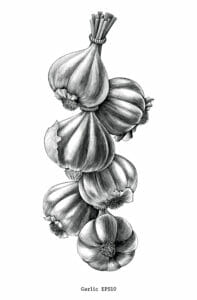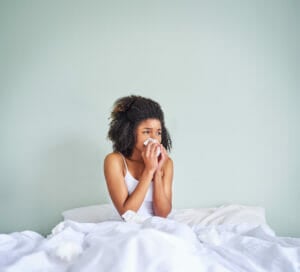How to Get Rid of a Cold with Natural Methods

Table of Contents
Vitamin C
Vitamin C is one of the most common go-to’s when the sniffles hit—in the form of fizzy powders, capsules, and orange juice—but it is also one of the most controversial. After first being linked to a reduction in cold symptoms in the 60’s, there have been multiple studies into vitamin C, with mixed results. Most studies don’t show a preventative effect—people who take vitamin C supplements get sick at around the same rate as people who don’t, with a few exceptions. If you are often exposed to cold weather or if you are an athlete, especially a winter one, vitamin C may reduce your risk of catching a cold.
Vitamin C also likely reduces the days of symptoms, when taken in high doses at onset—although how many days fewer is a matter of debate and depends on the study. Some studies cite as much as a 39% reduction in illness days and some cite zero. A meta-review of 30 studies took a look at the quality of each study and concluded the likely actual reduction in sick days was 8 or 9 percent, or half a day. (1) While that might not seem like a lot, when you don’t feel well, every hour closer to full health is of benefit. The authors noted that high doses were more likely to produce results, with up to 8 grams (800 milligrams) being well tolerated.
Zinc
Zinc is known as an immune booster and after multiple studies there seems to be pretty solid evidence for the notion that zinc reduces the severity of cold symptoms—with one caveat—it needs to be taken at the onset of symptoms.
A Cochrane review of 13 published studies found that zinc supplementation at the beginning of a cold had a mild to moderate effect on both the number of days and severity of symptoms. There wasn’t what the reviewers called “conclusive evidence” for the use of zinc as a daily preventive of the cold but there were two interesting studies included. The results of the two were pooled and the reviewers noted a decrease in the incidence of colds in children taking zinc. One study found a decrease of .5 per season and the other a more significant decrease of 1.8 colds a season.
When taken at the onset of symptoms, some of the studies included in the review found that symptoms were reduced by a day or more and the reviewers called the evidence “conclusive”. They do note that zinc supplementation may also come with some undesirable effects, including a bad taste in the mouth (especially with lozenges) and nausea, increasing with the dose (2). It’s important to note that high does of zinc can be harmful, especially in children so always consult with your doctor.
Echinacea
Echinacea is an herb used in traditional medicine. It has been studied for its potential as a preventative against the common cold as an agent to reduce symptoms, with mixed results. While some studies report a significant difference, a meta-analysis of over four thousand trial participants found little significant difference in those that received echinacea vs. a placebo.
One of the included studies did find a cold risk reduction of between ten and twenty percent among those that took echinacea as a preventative measure. Despite the conclusion of this one study, the lack of other supporting studies leaves room for doubt that echinacea can effectively get rid of a cold. (3)
Elderberry Extract
A study investigating the relationship between elderberry extract and cold symptoms in long-haul travellers found that there was a correlation. They found that travellers starting a regimen of standardised elderberry extract 10 days before travel and continuing into day 4 or 5 after arrival experienced far fewer cold symptom days—an average of 2 days. The researchers hypothesized that the antioxidant effects of elderberry account for its result, although they didn’t uncover the exact way it works in the body in this study. They found no severe adverse events that could be attributed to elderberry and concluded that further study to decisively link elderberry and fewer cold symptoms was warranted. (4)
Garlic

One meta-analysis found that there were eight studies, of varying quality, investigating the relationship between garlic and the common cold. They found only one that met their rigorous standards—a placebo controlled study. The study followed subjects for 12 weeks as they either took a garlic supplement or received a placebo and then noted the instances of infection with the cold virus as well as the days the subjects were ill.
While there were considerably fewer subjects taking the garlic supplement that became ill with the cold (24) than the placebo group (65) they noted the length of the illness was similar in both groups.
The authors of the analysis classified this as a positive result in favor of garlic but they also caution that due to the relatively small size of the study, and the lack of other studies to confirm the results, “robust conclusions cannot be drawn”.
They did note there was a lack of severe side effects from using garlic as a potential preventive of the common cold. (5)
Chicken Soup
Another well-loved folk remedy spanning cultures, chicken soup may have anti-inflammatory properties. The hot broth could help clear up stuffy noses as well as soothe sore throats, and it is hydrating and nutritious. (6)
Other Ways to Feel Better
Although they won’t get rid of a cold, there are things you can do to make yourself more comfortable while you’re sick
Get plenty of sleep—this standard advice is especially important when you are sick. Sleep boosts the immune system. In addition to releasing special immune cells during sleep, the body needs to conserve what energy it can for fighting infections. While getting enough sleep is always important, when you’re ill, it’s best to rest as your body needs, especially the first few days.
Hydrate—drink lots of water, and preferably something hot to help clear up stuffy noses. Hot ginger tea may help settle the stomach and adding honey to hot drinks soothes sore throats. Staying hydrated is even more important if you have a fever so try and drink a bit extra if you’re running one. It’s best to avoid caffeine, as it may interfere with that all important sleep, in addition to dehydrating the body. Avoid alcohol as well, it may dehydrate you even further.
Use a humidifier—dry air can irritate the throat and make coughing worse.
Over the counter pain relief/fever reducers—acetomenitin, ibuprofen, or aspirin are all options for adults. All have been known to irritate the stomach, especially of sensitive individuals, with high dose ibuprofen being the hardest on the stomach. Aspirin can also thin the blood and interfere with blood thinning medications so always check with your doctor if you have any concerns.
What Won’t Get Rid of Cold
Antibiotics—Since a cold is a viral infection and antibiotics target bacterial infections, they simply won’t work. Also, overusing antibiotics can cause antibiotic resistance, meaning they may not work—bad news for you when you do have a bacterial infection.
The biggest takeaway from the research is that although there is no “cure” for the cold, and perhaps no sure fire way to prevent one either, there are absolutely some ways to make yourself feel better, including grandma’s recipe for chicken soup. Wash your hands, don’t touch your face and if you do happen to get sick, rest, stay hydrated, and take care of yourself!
Thank you for taking the time to read How to Get Rid of a Cold with Natural Methods
Please note: All information presented to you in this website is intended for your general knowledge only and is not a substitute for medical advice or treatment for specific medical conditions. We cannot, and will not give you medical advice. We strongly recommend you consult your physician for any and all specific health issues. If you have any questions or contributions, please contact us via email or phone-call. We are constantly looking for new information to promote wellness – and hearing from you would make our day.
Live Vibrantly!



